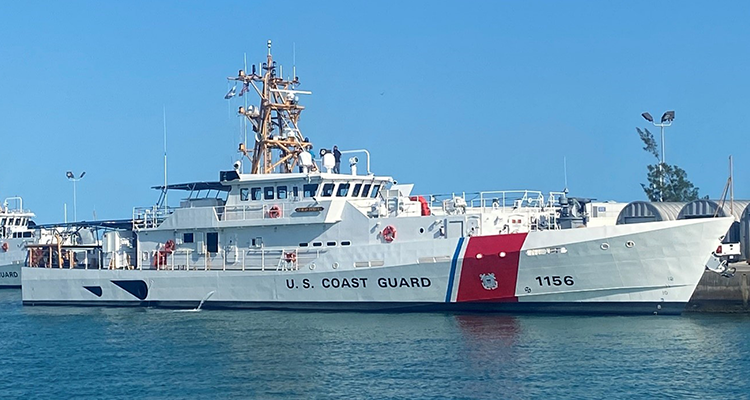April 1, 2024 —


Coast Guard Cutter David Duren, the Coast Guard’s 56th fast response cutter, was accepted in Key West, Florida, March 14. After the cutter is commissioned into service, it will be homeported in Astoria, Oregon. U.S. Coast Guard photograph.
The Coast Guard accepted delivery of the 56th fast response cutter (FRC), David Duren, March 14 in Key West, Florida. David Duren will be the first of three FRCs homeported in Astoria, Oregon.
FRCs, named after Coast Guard enlisted heroes, are a key component of the Coast Guard’s surface fleet. Recapitalizing the capabilities of the 1980s-era Island class 110-foot patrol boats, each has a top speed of 28 knots and is equipped with artillery and interoperable command and control systems. These capabilities help our Coast Guard members successfully conduct missions such as ports, waterways and coastal security; fishery patrols; search and rescue; and national defense.
The FRC’s enhanced capabilities are on display in support of Combined Task Force (CTF 150) operations, resulting in several seizures over the past six months: an interdiction of illegal narcotics in the Gulf of Oman; a seizure of methamphetamines, heroin and hashish with a street value of $25 million in the Arabian Sea; and another disruption of illegal drugs with a street value of $9.5 million in the Arabian Sea. These operations, in conjunction with U.S. Navy and international partners that comprise CTF 150, are part of a combined removal of more $1 billion of illegal drugs from the region since 2021.
The namesake for this FRC, Master Chief Petty Officer David N. Duren, enlisted in the Coast Guard in 1965 and was first assigned to Kukui, a sea-going buoy tender out of Honolulu, Hawaii. From there, he transitioned into training for search and rescue boat operations specific to sea and weather conditions in the Pacific Northwest. In the following years, Duren would become a heavy weather coxswain and graduate from the Coast Guard’s National Motor Lifeboat School in 1969, becoming certified as Coast Guard surfman No. 100.
While serving as officer-in-charge at Coast Guard Station Depoe Bay, Oregon, Duren would perform a series of heroic rescues that would contribute to his rightfully earned nickname as “Big Wave Dave,” as well as respect as a forward-leaning and compassionate leader.
On Feb. 1, 1979, Duren and a fellow crewmember responded to a distress call from a small craft sinking in the surf off Oregon’s Siletz River Bar. Skillfully maneuvering through breaking 8-foot surf and floating debris from the sinking vessel, he located the two survivors, frightened but alive, in the water. Duren overcame a sporadically functioning motor, pounding surf and the presence of dangerous breakers to guide his craft back to shore where emergency vehicles waited.
In the following year, Duren organized a team of surface swimmers to rescue three boys stranded on an offshore rock surrounded by a quickly rising tide at Oregon’s Fogarty Creek State Park. Battling the surf, tide and the boys’ growing fatigue, Duren led his team in forming a rescue line to assist the boys to the beach and bring them to safety. When the last boy was knocked off the rock, separating him from his would-be rescuer, Duren, disregarding his lack of a wetsuit, swam to the boy’s aid and brought him safely to shore.
During his tenure at Station Depoe Bay, Duren received two Coast Guard Medals for exceptional heroism and the Douglas A. Munro Inspirational Leadership Award; deployed on search and rescue cases more than any other officer-in-charge; and participated in 250 cases in one year. Personnel under his command received a total of 24 medals and awards. After 28 years of service, Duren retired in 1993.
The Coast Guard has ordered 65 FRCs to date. Fifty-five are in service: 13 in Florida; seven in Puerto Rico; six in Bahrain; six in Massachusetts, four in California; three each in Alaska, Guam, Hawaii, Texas and New Jersey; and two each in Mississippi and North Carolina. In addition to Astoria, future FRC homeports include Kodiak and Seward, Alaska.
For more information: Fast Response Cutter Program page